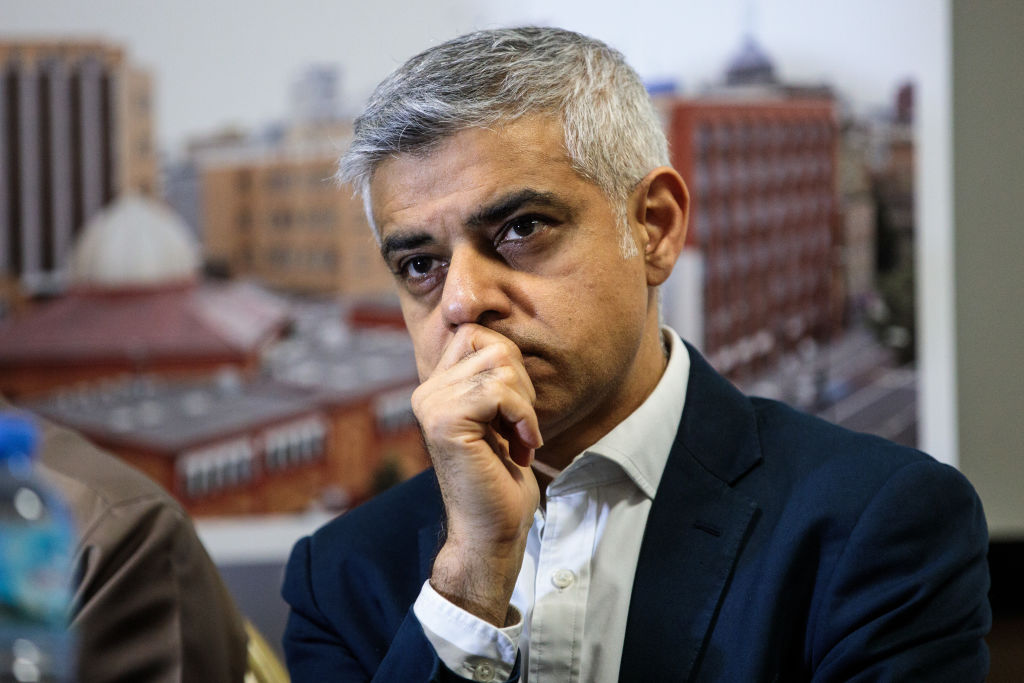There is something really ugly in Sadiq Khan’s description of stabbings in London as the ‘human cost of austerity’. What’s he saying? That being poor makes you a violent maniac? That being hard-up increases your likelihood of wanting to take a knife from the kitchen drawer and use it to slice some kid’s face? Does he really believe that individuals see things closing down — youth centres, libraries, mental-health programmes — and think to themselves: ‘This is bad. I’d better go out and stab someone in the neck’?
Khan’s new focus on poverty and knife crime is intended to sound sympathetic and progressive. But in fact it is incredibly dehumanising. It reduces poor people to the level of attack dogs who respond in a demented, murderous way to the stimuli of their everyday lives. No more after-school activities? Fewer mental-health resources? Less state spending on youth outreach? ‘Get the knives out, boys, we have to kill people now.’
Khan claimed this week that new research from City Hall, collated from police and ambulance figures, shows a ‘direct link’ between poverty and the knife-crime epidemic. A direct link. He is confusing correlation with causation. Just because there is a correlation between poor areas of London and knife crime doesn’t mean that poverty leads to, or is even ‘directly linked’ to knife crime. To suggest a ‘direct link’ is specious and also historically illiterate.
There have always been poor people. I grew up among poor people. They didn’t go around in gangs stabbing each other on street corners. Or throwing acid at each other, which is another nihilistic trend that took off in London for a while.
Clearly there is something specific about today, beyond the routine coping with difficult economic circumstances, that fosters or inflames a criminal culture in certain parts of the capital. Unable to address these specific things, Khan instead reaches for the elitist lefty canard that if you’re poor you’re pretty likely to commit a crime. You can’t help yourself. Bless.
Partly, Khan’s aim is to use the stabbing epidemic as a kind of leverage against the government. And yes, this is as gross as it sounds. This week he gave a speech near where a kid was stabbed recently and said in the speech that officials must end the ‘nine-year experiment to shrink the state’. This looks like a grisly form of political blackmail, where Khan is essentially telling the Tories that if they don’t reverse some of their economic policies, then more kids will die. But again, the idea of a direct link between a Tory policy to cut back on welfare funding, say, and the setting-up of a gang of youths who think nothing of stabbing local people they hate is bizarre and unsustainable.
Khan, of course, is very choosy about which aspects of the state we should stop ‘shrinking’. He wants state money to be lavished on youth services and mental-health services but he was very iffy for a while about the use of state resources to stop and search suspicious-looking kids in the street.
In 2015, when he was running to be mayor, he promised to do ‘everything in my power’ to cut the use of stop-and-search. And yet, the correlation between cutting back on stop-and-search in recent years and the rise of knife crime is arguably stronger than the correlation between poverty and knife crime. Khan has since reversed his decision and stop-and-search has returned to parts of London.
Part of the reason Khan and many of his cheerleaders in the Labourite and woke left don’t want to dig down into the knife-crime problem is because they know it touches upon far more than poverty or austerity. It touches, primarily, on social and cultural tensions that the modern left just does not want to address. And they will brand anyone who does address them as a racist.
This crisis raises questions primarily about the failure of integration and the crisis of adult authority. About the fact that significant sections of London youth, especially those in certain immigrant-descended communities, seem not to have been fully integrated into the laws and habits of the city. And about the fact that there seem to be very few strong moral deterrents to a life of crime these days, whether that deterrent is a stern, authoritative father figure in these kids’ lives, or the proper application of the law against knife criminals, or a broader sense of moral judgement that is willing to instruct the young about what they should and shouldn’t do.
Knife crime is not the ‘human cost of austerity’. But it does speak, profoundly, to a society that has become so frayed and so morally relativist that young people increasingly get the message that they can do whatever they like.







Comments